|
|
|
Sort Order |
|
|
|
Items / Page
|
|
|
|
|
|
|
| Srl | Item |
| 1 |
ID:
092066
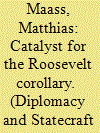

|
|
|
|
|
| Publication |
2009.
|
| Summary/Abstract |
The "Roosevelt Corollary to the Monroe Doctrine of 1904/05" constitutes a landmark in United States foreign policy. However, the 1902/03 Venezuela Crisis-in particular, the arbitration process between the South American country and Germany, Great Britain, and Italy that settled the crisis-led to President Theodore Roosevelt's decision to amend the Monroe Doctrine. The arbitrational award was an important impetus for the corollary because its decision appeared to encourage future European interventions in the western hemisphere. The Roosevelt Corollary was needed to prevent a situation similar to the 1902/03 Venezuela Crisis from occurring again. Strategically speaking, Roosevelt felt the corollary was necessary to uphold the Monroe Doctrine under new circumstances.
|
|
|
|
|
|
|
|
|
|
|
|
|
|
|
|
| 2 |
ID:
148500


|
|
|
|
|
| Summary/Abstract |
John Mearsheimer has compared China’s attitude towards the South China Sea to the Monroe Doctrine of the United States. Mearsheimer does not accord international law much weight and certainly does not regard it as determinative of political outcomes. But many observers of China’s disputes in the South China Sea look to international law for rules and processes that could facilitate peaceful resolution of the disputes. In doing so they are variously puzzled, bemused, and/or angered by China’s assertion of the nine-dash line (南海九段线). This article draws more broadly on the literature on the Monroe Doctrine, viewing the doctrine as: a unilateral pronouncement of foreign policy; representing resistance; embedded in domestic as opposed to international law; and an assertion of legitimate regional hegemony. Through applying the analogy of the Monroe Doctrine, the article seeks fresh insights into China’s legal position in relation to the South China Sea and into the significance of the nine-dash line in terms of international law.
|
|
|
|
|
|
|
|
|
|
|
|
|
|
|
|
| 3 |
ID:
075124
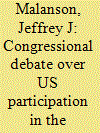

|
|
|
| 4 |
ID:
173275
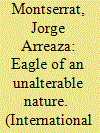

|
|
|
|
|
| Summary/Abstract |
SINCE ITS FOUNDING, Venezuela has been a country of solidarity, with the conscience of belonging to something greater, an immense nation, a power in the making that, had it consolidated itself legally, economically, and politically, it would have modified the "universal equilibrium," the balance of power in international relations. Venezuela's only military action outside of its borders was inevitably tied to its original right to self-determination as a sovereign people. Our soldiers reached inhospitable landscapes of Our America, always with the intention of expanding the feat of independence, with no aim for profit or glory or nothing different from the liberation from the imperial dominance of those times. Our leaders and armies of then never aspired to loot or conquer territories for themselves. The only cause was to share liberty, acquire independence, and simply, being free.
|
|
|
|
|
|
|
|
|
|
|
|
|
|
|
|
| 5 |
ID:
145213
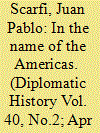

|
|
|
|
|
| Summary/Abstract |
The historiography of the Monroe Doctrine has tended to concentrate on nineteenth century interpretations, as proposed by U.S. politicians. More importantly, Latin American interpretations of the doctrine have been overlooked. This article explores the hemispheric intellectual history of the doctrine in the U.S., Argentina, Brazil, Chile, and Uruguay, examining its re-interpretation by Latin American jurists and politicians, such as Luis María Drago, Alejandro Álvarez and Baltasar Brum, and the reactions it provoked in the U.S. in the context of the emergence of the modern version of Pan-Americanism (1889) and a continental approach to international law. It argues that by re-interpreting the Monroe Doctrine as a Pan-American principle, these Latin American figures contributed in turn to redefining U.S. hemispheric hegemony along the lines of multilateralism and non-intervention. However, U.S. politicians and jurists were for the most part reluctant to renounce U.S. unilateral aspirations and interventionism on the continent until 1933.
|
|
|
|
|
|
|
|
|
|
|
|
|
|
|
|
| 6 |
ID:
000668
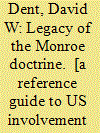

|
|
|
|
|
| Publication |
Westport, Greenwood, 1999.
|
| Description |
xx,418p.
|
| Standard Number |
0313301093
|
|
|
|
|
|
|
|
|
|
|
|
Copies: C:1/I:0,R:0,Q:0
Circulation
| Accession# | Call# | Current Location | Status | Policy | Location |
| 042047 | 237.7308/DEN 042047 | Main | On Shelf | General | |
|
|
|
|
| 7 |
ID:
030672
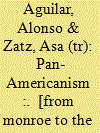

|
|
|
|
|
| Publication |
New York, Monthly Review Press, 1965.
|
| Description |
192p.
|
|
|
|
|
|
|
|
|
|
|
|
Copies: C:1/I:0,R:0,Q:0
Circulation
| Accession# | Call# | Current Location | Status | Policy | Location |
| 001751 | 320.540973/ANG 001751 | Main | On Shelf | General | |
|
|
|
|
| 8 |
ID:
160590
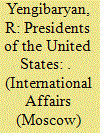

|
|
|
|
|
| Summary/Abstract |
IN LIGHT OF his immense constitutional authority and the post he holds in the structure of the American government, the personality of any U.S. president has always been considered exceptionally important, even if it does not entirely correspond to the high moral and political criteria the voters - and moreover, the international community - attribute to him. The President of the United States is both head of the Federal government and commander-in-chief of the U.S. armed forces. In addition to being the country's top government official, he is also head of one of its two leading political parties, with enormous responsibilities for taking political and moral action on behalf of the entire nation - and the world community as well.
|
|
|
|
|
|
|
|
|
|
|
|
|
|
|
|
| 9 |
ID:
104097


|
|
|
|
|
| Publication |
2009.
|
| Summary/Abstract |
Many scholars assume that the European model of realpolitik will prevail in Asia as the dual rise of China and India reorders regional politics. Others predict that Asia's China-centric tradition of hierarchy will reassert itself. But Indians look as much to nineteenth-century U.S. history as to any European or Asian model. Indeed, successive prime ministers explicitly cited the Monroe Doctrine to justify intervention in hotspots around the Indian periphery. But the Monroe Doctrine underwent several phases during America's rise to world power. These phases can help South Asia analysts project possible futures for Indian maritime strategy.
|
|
|
|
|
|
|
|
|
|
|
|
|
|
|
|
|
|
|
|
|